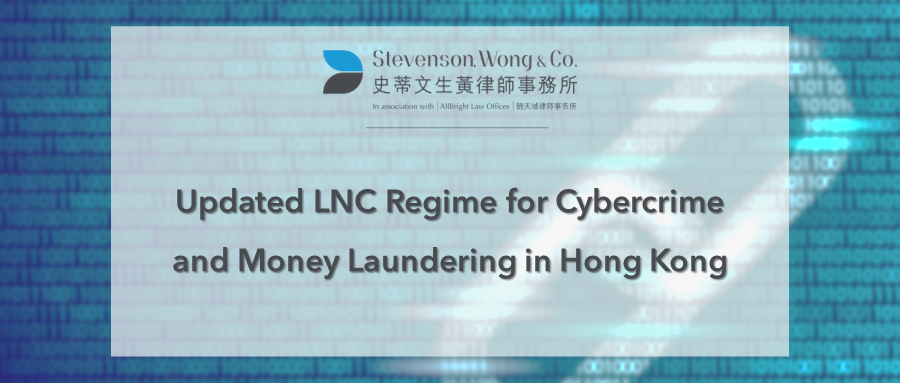With the recent escalation of cybercrime and internet scams, we have handled a wide range of asset tracing and recovery actions domestically and internationally. As time is of the essence, there always is the risk that the misappropriated assets would be dissipated quickly. To advise our clients taking out costs-effective applications for Mareva and/or proprietary injunction and/or banker’s trust orders against the fraudsters in a timely manner with further assets tracing, if necessary, we have assisted our clients recovering the stolen monies by and large in the current legal system.
Traditionally, upon receipt of any victim’s Suspicious Transaction Report (“STR”) or police report, the Joint Financial Intelligence Unit (“JFIU”) of the HK Police Force (“HKPF”) may issue a Letter of No Consent (“LNC”) to the relevant financial institution(s), pursuant to which the recipient should stop further disposal of the misappropriated assets. A financial institution disregarded the LNC and allowed the assets to be transferred out of the account would be liable for an offence under Section 25 of the Organised Serious Crime Ordinance, Cap. 455 (“OSCO”).
However, in a recent Hong Kong case Tam Sze Leung & Ors v Commissioner of Police [2021] HKCFI 3118, the Court of First Instance on 30 December 2021 held that the LNC regime is unlawful.

Brief Facts
Four Applicants, who had a total of 12 bank accounts maintained in several banks in Hong Kong, were found unable to withdraw funds from their accounts since around December 2020. Upon making enquiries with the banks and the Commissioner of HKPF (“the Commissioner”), the Applicants were informed that they were under investigation by the Financial Investigations Division of Narcotics Bureau in relation to an indicatable offence of dealing with property known or believed to represent proceeds under Section 25 of the OSCO.
It transpired that the Applicants were suspected of having involved in a money-laundering scheme and were under investigation by the Securities and Futures Commission (“SFC”) since 2019. In November 2020, the JFIU notified the relevant banks about their investigations, procured them to file STRs and informed them that LNCs would be issued soon. As per the JFIU’s request, each of these banks filed their STRs and received LNCs from the JFIU. All the relevant bank accounts were then frozen. The LNCs were maintained for the next 10 months until the restraint orders against the Applicants and the said accounts were awarded by the Court.
Court’s Decision
The Applicants raised six grounds to challenge the LNC regime and three of them were successful, namely (i) ultra vires, (ii) not prescribed by law and (iii) lack of proportionality.
(i) Ultra vires
The Court accepted that the LNC regime might contribute to the overall objectives of the OSCO when the Forces Procedure Manual (“FPM”) and the Police’s internal guidelines set out the procedures to comply with for the issuance of LNCs. However, looking at the language of Section 25A(2)(a) of the OSCO, the Court agreed with the submissions made by the Applicant’s Counsel that it was implausible that the legislature could have intended to enact the secret, informal and unregulated asset freezing power which the Commissioner asserted to be enjoyed under the LNC regime.
As the Court decided that using the express provision relating to LNC under Section 25A(2)(a) of the OSCO for securing an informal and unregulated freezing of assets was to use that power for a purpose other than that for which it was supplied, the Court held that the LNC regime was ultra vires OSCO.
(ii) Not prescribed by law
The Court held that the LNC regime was not ‘prescribed by law’. The requirements for the concept ‘prescribed by law’ include the law should be adequately accessible and formulated with sufficient precision to enable citizens to regulate their conduct. In the present case, there was insufficient clarity as to the scope of the power under the LNC regime and the manner of its exercise, together with inadequate effective safeguards against abuse under the OSCO and the FPM, the Court concluded that the LNC regime was not prescribed by law.
(iii) Lack of proportionality
The Court accepted that there was a legitimate purpose for the LNC regime to deter criminal activity by restricting access to the proceeds of crime. Nonetheless, the LNC regime operated without temporal limitation but only having been observed with intermittent internal review and lacking of proportional assessment on the reasonable length of its operation, the Court did not consider that a reasonable balance had been struck between the necessity to combat money laundering and one’s right to the use of property under Article 105 of the Basic Law. Therefore, the Court held that the LNC regime failed in the proportionality assessment.

Analysis and Takeaways
In Tam Sze Leung, the Court accepted that although the Commissioner was free to express or report suspicious transactions after its ongoing investigations to financial institutions so as to take all steps which appeared necessary for keeping peace, preventing crime and protecting property from criminal actions, the Court was reluctant to uphold the LNC regime which would violate to our current laws. Be that as it may, we trust that the relevant financial institutions will continue at the moment to follow the LNC regime unless there is any new development in the Hong Kong legislation catching up with the ratio herein.
Moreover, Tam Sze Leung does not affect the obligations of the bankers under Sections 25 and 25A of OSCO. The bankers are still obliged to closely monitor any suspicious accounts and to file STRs where appropriate. It is prudent for the bankers to ensure effective anti-money laundering policies and mechanisms, which have to be in place and to keep a good record of all the documentation and evidence in support of their decision to restrict or freeze any suspected accounts. We recommend the bankers to regularly review their decisions on freezing the suspected accounts and to check with the law-enforcing authorities in response to any changes or updates in circumstances.
The full impact of Tam Sze Leung remains to be seen, pending the relief to be granted by the Court to the Applicants and the potential appeal of the decision by the parties. In addition, the constitutional problems identified in this case are yet to be resolved or addressed through legislative amendment or enactment. With the uncertain development of the LNC regime, for now, it is advisable for the victims of commercial crimes to apply for relevant injunctions and/or appropriate court orders to stop any dissipation of funds as early as possible.
This article is authored by Ms. Milly Hung, Partner, Mr. Michael Lau, Senior Associate and Mr. Warwick Tam , Associate of Litigation Department of Stevenson, Wong & Co. If you have any problem in relation to this matter, please contact Ms. Milly Hung on (852) 2533 2561 or email to millyhung.office@sw-hk.com.
This article is for information purposes only. Its content does not constitute legal advice and should not be treated as such. Stevenson, Wong & Co. will not be liable to you in respect of any special, indirect or consequential loss or damage in relation thereto.
